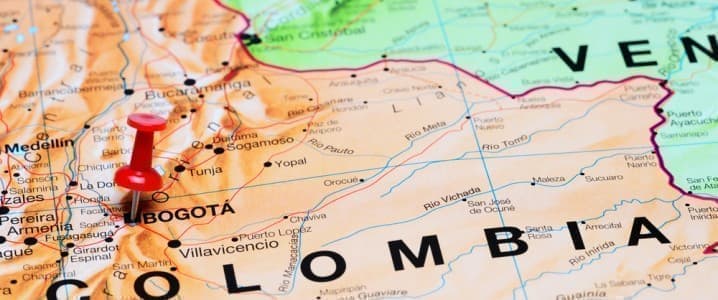Business
Big Oil Exits Colombia as Violence and Fiscal Crisis Escalate

Colombia’s oil industry faces a significant downturn as major energy companies, including Exxon, withdraw from the country amid escalating violence and a severe fiscal crisis. Since the inauguration of Gustavo Petro, Colombia’s first leftist president, in August 2022, a series of policy changes have created an environment of uncertainty, prompting these supermajors to cut investments or exit entirely.
The ban on hydraulic fracturing, implemented by Congress in mid-2023, marked a pivotal moment for the industry. Exxon, which had significant interests in Colombia, decided to suspend or liquidate its eight exploration contracts, heavily influenced by this ban along with increased taxation and rising insecurity. The U.S. supermajor officially abandoned its fracking initiatives, including the Kale and Platero pilot projects, which were under review since 2022 in partnership with Ecopetrol, Colombia’s national oil company.
In addition to the fracking ban, the Colombian government has enacted a series of tax hikes that further strain the oil sector. A new tax structure introduced in November 2022 imposed levies that increased based on international Brent prices, reaching up to 15% when prices exceeded $82.20 per barrel. Although Colombia’s Constitutional Court overturned attempts to eliminate the tax deductibility of royalty payments, ongoing fiscal pressures have led the Petro administration to implement a temporary 1% levy on crude oil sales, which could remain in place until the end of 2025.
The looming fiscal crisis has prompted ratings agencies such as S&P and Moody’s to downgrade Colombia’s credit rating, heightening concerns over a growing budget shortfall projected at around $6.5 billion, or approximately 26 trillion Colombian pesos. This fiscal strain comes at a time when Colombia is grappling with rising violence, particularly in rural regions where oil operations are concentrated.
The security situation has deteriorated significantly, with renewed conflicts between government forces and illegal armed groups such as the National Liberation Army (ELN) and the Gaitanist Self-Defense Forces (AGC). As violence escalates, it poses ongoing risks to oil operations, especially in areas like Cauca, Putumayo, and Arauca, which are critical to the nation’s hydrocarbon production. Reports indicate that clashes between security forces and armed groups have become increasingly common, leading to production disruptions and heightened operational costs.
The rise in cocaine production in these oil-rich regions has further fueled violence, as illegal groups vie for control over this lucrative trade. In 2023, Colombia recorded over 2,664 metric tons of cocaine production, with coca cultivation expanding to a record 253,000 hectares. This uptick in drug trafficking and associated violence is exacerbating the challenges faced by the oil sector.
In light of these developments, other major companies are also reassessing their positions in Colombia. Shell announced its exit from three offshore natural gas blocks in April 2025, while Repsol has engaged in divesting assets, including a significant onshore block for $452 million. These exits reflect a broader trend of disinvestment in Colombia’s oil and gas sector, which has struggled to regain momentum since the COVID-19 pandemic.
As Colombia’s energy landscape continues to shift, the consequences of dwindling foreign investment and increased operational risks may threaten the country’s energy security. With the potential for an energy crisis looming, the government’s fiscal policies and security strategies will be under intense scrutiny as they navigate these turbulent waters. The outlook for the oil industry remains precarious, and the ongoing internal strife could further complicate efforts to stabilize an already fragile economy.
-

 Health3 months ago
Health3 months agoNeurologist Warns Excessive Use of Supplements Can Harm Brain
-

 Health3 months ago
Health3 months agoFiona Phillips’ Husband Shares Heartfelt Update on Her Alzheimer’s Journey
-

 Science1 month ago
Science1 month agoBrian Cox Addresses Claims of Alien Probe in 3I/ATLAS Discovery
-

 Science1 month ago
Science1 month agoNASA Investigates Unusual Comet 3I/ATLAS; New Findings Emerge
-

 Science4 weeks ago
Science4 weeks agoScientists Examine 3I/ATLAS: Alien Artifact or Cosmic Oddity?
-

 Science4 weeks ago
Science4 weeks agoNASA Investigates Speedy Object 3I/ATLAS, Sparking Speculation
-

 Entertainment4 months ago
Entertainment4 months agoKerry Katona Discusses Future Baby Plans and Brian McFadden’s Wedding
-

 Entertainment4 months ago
Entertainment4 months agoEmmerdale Faces Tension as Dylan and April’s Lives Hang in the Balance
-

 World3 months ago
World3 months agoCole Palmer’s Cryptic Message to Kobbie Mainoo Following Loan Talks
-

 Science4 weeks ago
Science4 weeks agoNASA Scientists Explore Origins of 3I/ATLAS, a Fast-Moving Visitor
-

 Entertainment4 months ago
Entertainment4 months agoLove Island Star Toni Laite’s Mother Expresses Disappointment Over Coupling Decision
-

 Entertainment3 months ago
Entertainment3 months agoMajor Cast Changes at Coronation Street: Exits and Returns in 2025









